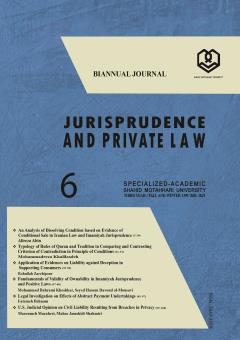-
-
-
Open Access Article
1 - Rational Fundamentals for Absoluteness of Collective Knowledge
Seyed Abolqasem Naqibi Mohammad Hossein SoheilyAbstract:The fundamentals of absoluteness of collective knowledge can be accurately explained in two separate categories: First, absoluteness of collective knowledge in rational terms, i.e. free from practical canonical principles. Second: Absoluteness of collective kno MoreAbstract:The fundamentals of absoluteness of collective knowledge can be accurately explained in two separate categories: First, absoluteness of collective knowledge in rational terms, i.e. free from practical canonical principles. Second: Absoluteness of collective knowledge in terms of Sharia law and with a view on those principles. This paper intends to study the first section. To that end, prohibition of the conclusive discord and the necessity of the conclusive consent has been studied. In the course of these discussions, it will become clear that although the prohibition of the conclusive discord is easily provable, proving of the necessity of conclusive consent has only two logical solutions: First, the rule of incumbency that is attributable only according to Mohaqeq Araqi’s theory of interpretation of collective knowledge. Second, absoluteness of the probability of religious duty in each segment of the collective knowledge that will be accurate only based on the negation of the rule of indecency of punishing the one who has not received the penal warrant. Also in this paper, attempts have been made to provide responses to the doubts posed by the opponents of the prohibition of the conclusive discord and the necessity of conclusive consent and the refutation expressed by Shahid Sadr to the rule of punishment of the one who has not received the penal warrant. Manuscript profile -
Open Access Article
2 - Investigating Validity of Probative Evidences and Its Application in Jurisprudence and Islamic Law
Seyed Abolqasem Naqibi Elham Maghzi NajafabadiAbstract: The validity of probative evidences is one of the fundamental discussions in methodology of religion. Probative evidences (religious circumstantial evidences) are among the evidences needed for interpretation and inference of the Sharia rules, the signifiers o MoreAbstract: The validity of probative evidences is one of the fundamental discussions in methodology of religion. Probative evidences (religious circumstantial evidences) are among the evidences needed for interpretation and inference of the Sharia rules, the signifiers of which–in addition to comparative signified–have sometimes evidentiary effects. Evidentiary effect in methodology means the religious effects attributable to the rational instruments, necessities and requirements, either ordinary or accidental, which can be taken as evidence or codes of action. In case of the validity of probative evidence and its reasons, three theories may be put forth: Some jurists attribute the nature of evidence, in terms of proof, depending upon its validity thus rule on absolute validity of probative evidence. Some others, however believing in absolute validity of the probative evidence, have attributed the reason to the quality of proof and attribution of the reasons for validity of the evidence. The third group of jurists believe in a detailed manner which draws a line of separation between various types of evidence and probative evidences. Apparently, to study the validity of probative evidences, the reasons for validity of the evidence must be taken into consideration. Therefore, if the reason behind validity of the evidence is an instance of compulsory obedience, its probative reasoning shall not be valid but if it is based on logical and consistent usages (which is true in the case of the majority of cases) the criterion will be constraints in logical usages and related terms. This is because men of reason at times take something as evidence while at the same time reject its probative values, such as evidence on probation, possession, presumption of marriage bed, and confession. Manuscript profile -
Open Access Article
3 - A Study of Conceptual Authority in Discerning the Condition of Banning Halal and Authorizing Haram in Imamiya Jurisprudence
Seyed Abolqasem Naqibi Sajjad RazaghiThe condition of banning Halal and authorizing of Haram is one of the most important discussions in Imamiya jurisprudence. Jurists consider the proviso enforceable in case the condition does not ban Halal nor authorize Haram. There is difference of opinion among them on MoreThe condition of banning Halal and authorizing of Haram is one of the most important discussions in Imamiya jurisprudence. Jurists consider the proviso enforceable in case the condition does not ban Halal nor authorize Haram. There is difference of opinion among them on conceptual authority in discerning the condition of banning Halal and authorizing Haram. Some jurists like Sheikh Ansari are of the opinion that the condition leading to authorization of an unchangeable rule on Haram and banning an unchangeable rule on Halal, shall be considered an instance of banning Halal and authorizing of Haram. Some other jurists, like Mohaqeq Yazdi and Nayini believe that the verdicts must first be divided into mandatory and conditional rules before expressing any authorization or banning. In mandatory rules, the late Naraqi – like Sheikh Ansari – only considers commitment to unchangeable rules (Wajib or religiously obligatory act and Haram or religiously forbidden) against the Book and Sunnah or tradition, however, commitment to act or avoid to act in permissible rules is allowed. Also, he says any change in conditional rules by setting a condition is against the Sharia law. Some other jurists, like Imam Khomeini, have resorted to the common law in expressing the quality of authority in its discernment. Manuscript profile
List of Articles Seyed Abolqasem Naqibi
-
The rights to this website are owned by the Raimag Press Management System.
Copyright © 2017-2024


